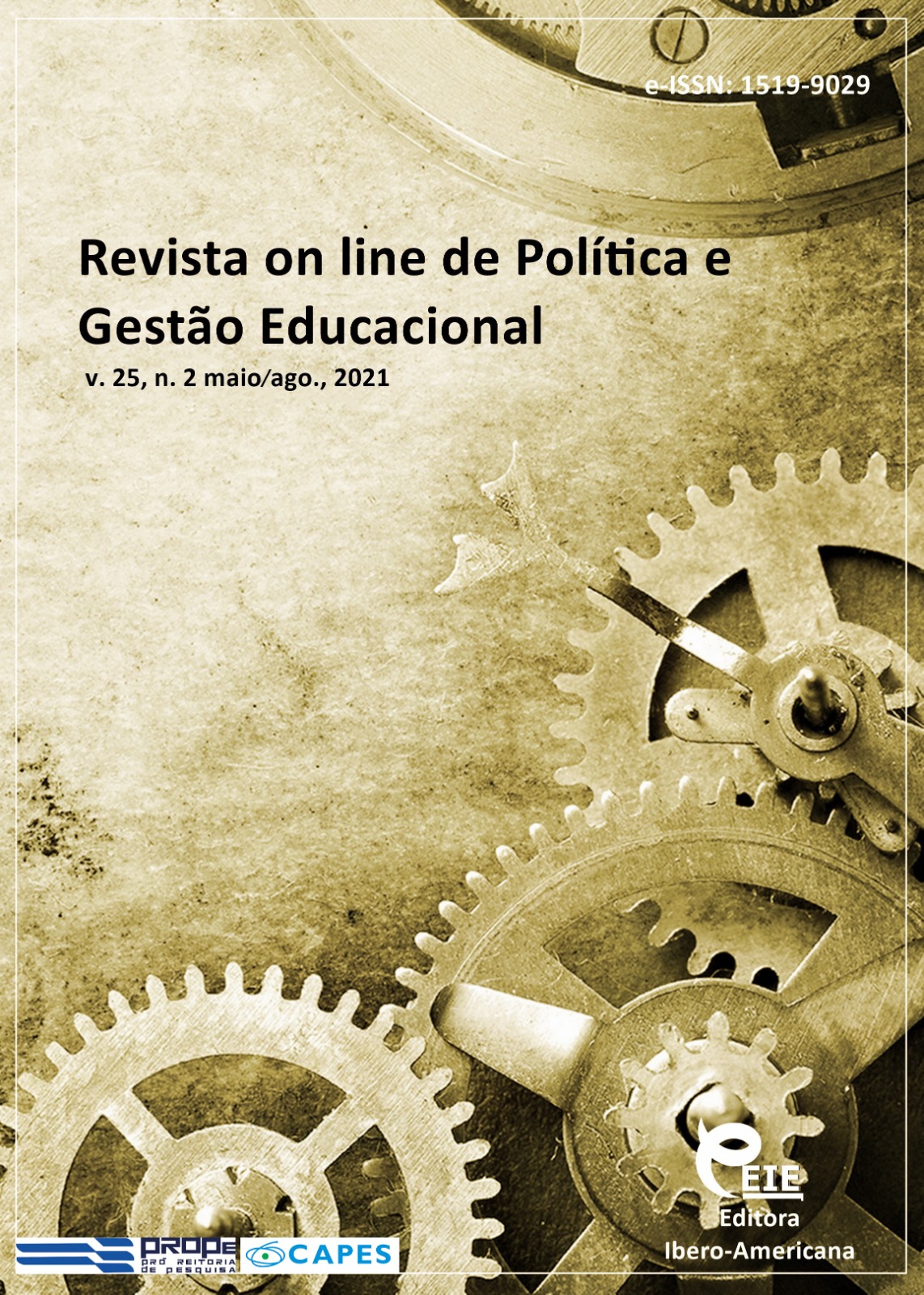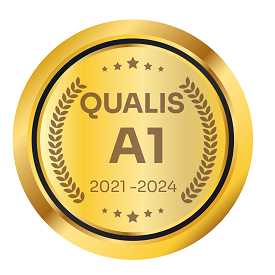Organización de la educación a distancia en el Instituto de Cultura y Arte de Yakutia del Estado Ártico
DOI:
https://doi.org/10.22633/rpge.v25i2.15315Palabras clave:
Entorno digital de aprendizaje, Educación a distancia, Moodle e-learning, AprendicesResumen
Este artículo presenta la organización del aprendizaje a distancia en el Instituto Estatal Ártico de Cultura y Arte (ASICA) de la República de Sakha (Yakutia). Muestra las características de la enseñanza a distancia en ASICA basada en el uso del sistema de gestión de la enseñanza a distancia Moodle. Lo importante para el funcionamiento del entorno de aprendizaje digital es la disponibilidad de recursos: materiales y técnicos, recursos humanos de los profesores con competencias multimedia formadas en el software y las tecnologías modernas utilizadas. El resultado de la encuesta se mostró en relación con la disponibilidad de información dentro del entorno Moodle, que proporciona todo tipo de clases y procedimientos para evaluar los resultados del aprendizaje cuya implementación prevé el uso de tecnologías de aprendizaje electrónico y a distancia. La importancia práctica del estudio radica en las particularidades de la formación de los estudiantes, futuros profesionales de la cultura y el arte, en la transición a la enseñanza a distancia.
Descargas
Citas
BARAKHSANOVA, E. A. et al. Transdisciplinary approach to training future managers for digital education in Yakutia. Propositos y Representaciones, v. 8, n. 3, е702, 2020.
BARAKHSANOVA, E. A. Methodological support for e-learning implementation in a pedagogical university. In: Intellectual technologies: humanitarian, social and legal and digital aspects. Materials of the all-Russian scientific-practical conference with international participation. 2019. p. 89-94.
BATOROV, A. R. Multimedia applications as an effective tool to support the learning process in the information and educational environment of the university of culture. Information and communication technologies and electronic resources in the system of cultural and civilizational transformations: the experience and problems of use in universities of culture and arts. Chelyabinsk, 2012. p. 208-214.
BAZAROVA, T. S.; SOLOVYOVA, R. A. To the problem of forming the ICT-competence of future engineers in the information and educational environment of the university. Ulan-Ude: Publishing house of the Buryat State University, 2018. p. 99-103.
FEDOROV, I. M. Transition from educational environment to educational ecosystem. Young Scientist, n. 28, p. 246-250, 2019.
GREENHOW, C.; LEWIN, C.; WILLET, K. B. S. The educational response to Covid-19 across two countries: a critical examination of initial digital pedagogy adoption. Technology, Pedagogy and Education, v. 30, n. 1, p. 7-25, 2020. DOI: doi.org/10.1080/1475939X.2020.1866654
HERNÁNDEZ, R. M.; CUMPA, R. O.; RODRÍGUEZ, S. Q. New ways of learning: teacher training in the use of ICTs. Propósitos y Representaciones, v. 6, n. 2, p. 671-701, 2018. DOI: dx.doi.org/10.20511/pyr2018.v6n2.248
KOSTIKOVA, N. A. et al. The didactic potential of university electronic information and educational environment in the context of a pandemic. Propósitos y Representaciones, v. 8, n. 3, e707, 2020. DOI: doi.org/10.20511/pyr2020.v8nSPE3.707
KUSHNIR, M. E. et al. Educational logistics in digital school. Informatics and Education, n. 9, p. 5-11, 2019. DOI: doi.org/10.32517/0234-0453-2019-34-9-5-11
LEGAN, M. V.; ROYAK, M. E.; GORBUNOV, M. A. DiSpace 2.0 e-learning system – a fundamental element of the digital educational environment (ecosystem) of NSTU. Professional Education in the Modern World, v. 10, n. 1, p. 3520-3531, 2020. DOI: doi.org/10.15372/PEMW20200115
LEVERIEVA, G. F.; BATOROV, A. R. Preservation of documentary heritage of the peoples of the Republic of Sakha (Yakutia). Library and Information Science, n. 3, p. 34-39, 2009.
LI, F.; WANG, L. Empirical Analysis of Return to Distance Higher Education in Different Disciplines. The International Review of Research in Open and Distributed Learning, v. 22, n. 1, p. 148-165, 2021. DOI: doi.org/10.19173/irrodl.v22i1.5029
LUO, N.; ZHANG, M. L.; QI, D. Effects of different interactions on students’ sense of community in e-learning environment. Computers & Education, v. 115, p. 153-160, 2017. DOI: doi.org/10.1016/j.compedu.2017.08.006
MIRONENKO, E. С. Digital educational environment: the concept and structure. Social Space, n. 4, p. 6, 2019.
PRATIWI, W. R. The practice of digital learning (D-Learning) in the study from home (SFH) policy: teachers' perceptions. Journal of Southwest Jiaotong University, v. 55, n. 4, 2020. DOI: 10.35741/issn.0258-2724.55.4.17
PROKOPIEV, M. S. et al. Development of a programming course for students of a teacher training higher education institution using the programming language Python. Propósitos y Representaciones, v. 8, n. 3, 2020. DOI: dx.doi.org/10.20511/pyr2020.v8n3.484
RIEBER, L. P. Participation patterns in a massive open online course (MOOC) about statistics. British Journal of Educational Technology, v. 48, n. 6, p. 1295-1304, 2017. DOI: doi.org/1010.1111/bjet.12504
RIZAL, R.; RUSDIANA, D.; SETIAWAN, W. Digital literacy of preservice science teacher. Journal of Physics: Conference Series, v. 1157, n. 2, 022058, 2019. DOI: doi.org/1010.1088/1742- 6596/1157/2/022058
RUSSIA. Priority project "Modern Digital Educational Environment in the Russian Federation". Ministry of Science and Higher Education: official website. 2018. Available: http://government.ru/projects/selection/643/. Access: 10 Dec. 2020.
SÁ, M. J.; SERPA, S. The covid-19 pandemic as an opportunity to foster the sustainable development of teaching in higher education. Sustainability, Switzerland, v. 12, n. 20, p. 1-16, 2020. DOI: doi.org/10.3390/su12208525
SAKULICH, N. B. Formation of ICT-competences of university students in the conditions of digital revolution. Pedagogical Journal, v. 7, n. 2A, p. 302-314, 2017.
VLASOVA, E. Z. et al. Artificial intelligence. The area of adaptive possibilities for methodological innovations in pedagogic education. Contemporary Dilemmas: Education, Politics and Values, v. 7, n. 10, С. 9, 2019b.
VLASOVA, E. Z. et al. Digital transformation of the pedagogical education in the Russian Federation. Contemporary Dilemmas: Education, Politics and Values, v. 7, n. 10, С. 52, 2019a.
VLASOVA, E. Z. et al. Teacher education in higher education systems during pandemic and the synergy of digital technology. Propósitos y Representaciones, v. 8, n. 3, e719, 2020. DOI: dx.doi.org/10.20511/pyr2020.v8nSPE3.719
VLASOVA, E. Z.; BARAKHSANOVA, E. A. Innovative solutions of teacher training for Northern regions to the use of e-learning. The Emissia, n. 9, p. 2762, 2019.
Publicado
Cómo citar
Número
Sección
Licencia
Derechos de autor 2021 Revista on line de Política e Gestão Educacional

Esta obra está bajo una licencia internacional Creative Commons Atribución-NoComercial-CompartirIgual 4.0.
Manuscritos aceitos e publicados são de propriedade da Revista on line de Política e Gestão Educacional. É vedada a submissão integral ou parcial do manuscrito a qualquer outro periódico. A responsabilidade do conteúdo dos artigos é exclusiva dos autores. É vedada a tradução para outro idioma sem a autorização escrita do Editor ouvida a Comissão Editorial Científica.











